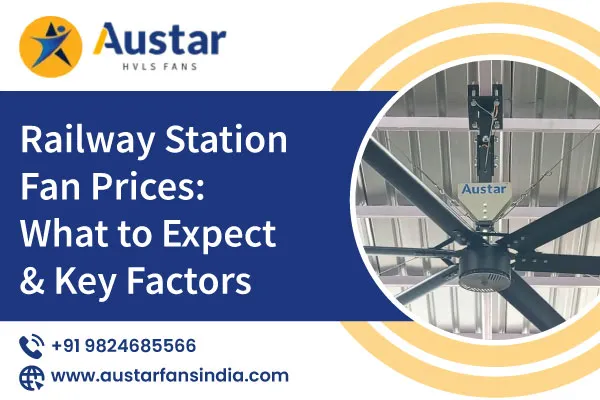
Railway stations are among the busiest public spaces in India, with thousands of passengers moving through them daily. Maintaining proper ventilation and airflow in such crowded spaces is essential. Traditional ceiling fans often fail to cover the vast areas of waiting halls and platforms. This is why HVLS (High Volume, Low Speed) fans have become the go-to choice. Their large blades move massive volumes of air efficiently, creating a comfortable environment for passengers while also reducing reliance on expensive air conditioning systems. The right HVLS fan for a railway station ensures not only comfort but also safety and long-term cost savings. Fans with proper capacity reduce heat, improve airflow, and lower energy bills. Choosing incorrectly sized or low-quality fans could lead to poor performance, noise issues, and frequent maintenance.
Factors to Consider When Buying HVLS Fans for Railway Stations
- Size and Capacity: Railway stations are huge spaces that require fans with large diameters, often ranging between 14 to 24 feet. The larger the fan, the greater the coverage area, ensuring even airflow across platforms and waiting halls.
- Noise Level: Since railway stations are already noisy environments, fans must operate quietly. HVLS fans designed with aerodynamic blades and vibration-reduction systems work effectively without adding unnecessary noise.
- Energy Efficiency: With electricity bills being a major expense, energy-efficient HVLS fans with BLDC or PMSM motors are the best choice. They consume significantly less power compared to multiple small ceiling fans or traditional cooling systems.
- Durability and Maintenance Requirements: Railway stations run continuously, so fans must withstand heavy use. Models with aluminum blades, galvanized coatings, and German-made motors ensure long-lasting durability with minimal maintenance.
Types of Railway Station HVLS Fans
- Ceiling Fans: Large HVLS ceiling fans are most common in railway stations. They cover wide areas, providing consistent airflow and reducing humidity.
- Wall-Mounted Fans: In areas with limited ceiling height or structural constraints, wall-mounted HVLS fans are useful to direct air circulation where needed.
- Tower Fans: Tower fans are movable and flexible, often used for temporary setups. While not as powerful as HVLS ceiling fans, they support cooling in specific zones.
- Industrial Fans: Heavy-duty industrial fans are installed in workshops, engine sheds, or specific back-end areas of railway stations where strong airflow is required for workers.
Average Prices of HVLS Fans for Railway Stations
- Budget-Friendly Options: Entry-level HVLS fans start from around ₹90,000–₹1,20,000. These are suitable for smaller spaces within stations, such as ticketing areas or small waiting rooms.
- Mid-Range Options: Fans in the range of ₹1,50,000–₹2,50,000 provide advanced features like better motor efficiency, noise reduction, and improved blade design. These are ideal for medium-sized platforms and concourses.
- High-End Options: Premium HVLS fans cost upwards of ₹3,00,000. They feature German motors, reinforced bearings, gearless technology, and smart automation features. These are best suited for large platforms, central halls, and busy junctions.
Factors That Influence Pricing
- Fan size and diameter.
- Type of motor (gear or gearless).
- Blade material and design.
- Control systems (manual, remote, or smart automation).
- Brand reputation and warranty coverage.
Why Choose Austar Technologies?
Railway stations are among the busiest public spaces, with thousands of passengers passing through every day. Managing airflow and ensuring passenger comfort in such large areas requires advanced cooling solutions. HVLS Fans for Railway Station are designed to provide powerful air circulation, reducing heat, humidity, and discomfort even in crowded environments. Austar Technologies is the leading manufacturer and supplier of Railway Station HVLS Fans in Gujarat, India. The company specializes in producing Big Fans For Railway Station, engineered to deliver high performance and long-lasting durability. With advanced designs and superior motor technology, these fans ensure energy efficiency, quiet operation, and consistent airflow across large spaces.
We manufacturer of both gear HVLS fans and gearless HVLS fans, available in various sizes to match different station layouts. Whether for platforms, waiting halls, or concourse areas, these fans are tailored to meet the demanding needs of railway infrastructure. By choosing high-quality solutions from Austar Technologies, railway stations can enhance passenger comfort, reduce electricity costs, and ensure reliable performance in one of the most challenging public environments.
Conclusion
When selecting fans for railway stations, consider size, airflow capacity, energy efficiency, durability, and noise levels. HVLS fans are the most efficient choice for covering large areas effectively. Investing in the right HVLS fan enhances passenger comfort, reduces electricity bills, and minimizes maintenance issues. Comparing features and understanding the specific requirements of the station ensures the best purchase decision. Contact us for more info about Railway Station Fan – +91 9824685566, online@austarfansindia.com
